

Leisurely breakfast as always. Walked with Cindy into town and then to the wood carver's village. As I approached I saw Tina and waved and shouted Hi to her. She looked at Cindy and I like we were totally deranged. Turns out Tina has a twin sister and we just met her!!! She figured it out and was very friendly. She was cleaning part of the family compound. An act, that I have seen repeated many times during my stay
Kapinga Village (some times known as Porakiet or Pohnrakied or various other spellings) is called the Woodcarver's Village by the locals. 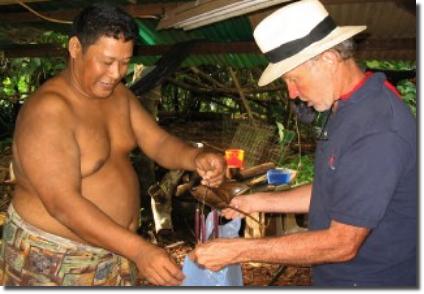 It seems to be the only place where such activity takes place. Not sure if this is a tradition or what. Anyway, about eight men ranging in age from 60 to 15 were just barely busy in the heat. The youngest was given the drudgery tasks typical of all apprenticeship programs. They were located in a semiprotected area, rusty tin roof with many patches, about 600 square feet, open on the sides with various projects in various states of completion. Centrally was a counter with finished works which consisted of many different sharks, dolphins and other sea creatures. There were a few woven mats that the women produce. I did not see any weaving going on. I suspect that weaving was done at the home then brought in by the men. No prices on anything, so you had to negotiate with the men. Quite frankly everything was much cheaper here than the same items sold on Kwajalein. Unfortunately they did not take credit cards, so I bought less than I would
It seems to be the only place where such activity takes place. Not sure if this is a tradition or what. Anyway, about eight men ranging in age from 60 to 15 were just barely busy in the heat. The youngest was given the drudgery tasks typical of all apprenticeship programs. They were located in a semiprotected area, rusty tin roof with many patches, about 600 square feet, open on the sides with various projects in various states of completion. Centrally was a counter with finished works which consisted of many different sharks, dolphins and other sea creatures. There were a few woven mats that the women produce. I did not see any weaving going on. I suspect that weaving was done at the home then brought in by the men. No prices on anything, so you had to negotiate with the men. Quite frankly everything was much cheaper here than the same items sold on Kwajalein. Unfortunately they did not take credit cards, so I bought less than I would 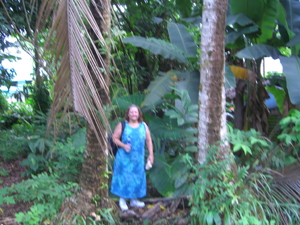 have otherwise. I figured that I would not need much cash on the trip and could use plastic. Boy was I wrong. Cindy bought the only horse carving there and a very ornate crab. The men disassembled the crab and marked it well so that she could easily reassemble it later. I bought some earrings, a dolphin, a mat and some other incidentals. I also purchased an ivory nut.
have otherwise. I figured that I would not need much cash on the trip and could use plastic. Boy was I wrong. Cindy bought the only horse carving there and a very ornate crab. The men disassembled the crab and marked it well so that she could easily reassemble it later. I bought some earrings, a dolphin, a mat and some other incidentals. I also purchased an ivory nut.
Cindy and I walked along the village streets. I took this picture of her by a taro plant. It is my fault that the picture is not in focus, not Cindy's. I had seen many taro plants but wanted her in the picture to get a sense of how big the leaves are. They grow wild here. Taro used to be the main starch in the Pohnpei diet, now, sadly, it has been replaced by white rice. Taro is native to Malaysia and was brought here by the early colonizers. They also brought pigs and other foodstuffs. Taro was known and used by Romans so the trade routes must have been well established by the end of the last ice age. Nutrition is becoming a serious problem on Pohnpei. Over half of Pohnpei children have vitamin A deficiency, a disorder leading to increased infection and mortality. Coupled with this, there are serious problems of obesity and chronic diseases in Pohnpei, such as diabetes, heart disease, and cancer, leading to higher rates of mortality and great suffering among families and individuals.This is on an island that has sustained a healthy population for thousands of years. There is plenty of food here, but they have always had plenty and have not learned how to preserve food in ways that other aboriginals have. When there is always fruit available you don't worry. Too bad their diet has become westernized. (I know I shouldn't be critical of them.)
Anyway, as Cindy and I wandered away from the woodcarver's village we saw the Nan Rakied Supper Souviner Maker store.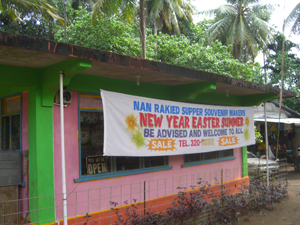 "New Year Easter Summer Sale" the store was hot, hot, hot and very humid. There were many Japanese customers, all who had removed their shoes before entering. I did not as my tennis shoes are hard to remove. I did talk to the owners, Urusula and Johnny Eliezer who said it was okay to keep them on. They assumed that Cindy was my wife. They do ship their merchandisce to Kwajalein for resale in the Micronesia Shop there. They hadn't been paid in a while so Cindy volunteered to check on that for them. She works part-time in the MIC shop here on Kwaj where artistic creations from the South Pacific are sold. Cindy had a need to examine each treasure, since it was way too hot in the store for me, and I had little cash with me, I went outside and watched the rest of the family working in the yard. There were several sleeping dogs. I wonder if dogs know that they are still a delicacy here. A woman was tending her wash on the clothesline; another was raking the yard slowly in keeping with the heat of the day.
"New Year Easter Summer Sale" the store was hot, hot, hot and very humid. There were many Japanese customers, all who had removed their shoes before entering. I did not as my tennis shoes are hard to remove. I did talk to the owners, Urusula and Johnny Eliezer who said it was okay to keep them on. They assumed that Cindy was my wife. They do ship their merchandisce to Kwajalein for resale in the Micronesia Shop there. They hadn't been paid in a while so Cindy volunteered to check on that for them. She works part-time in the MIC shop here on Kwaj where artistic creations from the South Pacific are sold. Cindy had a need to examine each treasure, since it was way too hot in the store for me, and I had little cash with me, I went outside and watched the rest of the family working in the yard. There were several sleeping dogs. I wonder if dogs know that they are still a delicacy here. A woman was tending her wash on the clothesline; another was raking the yard slowly in keeping with the heat of the day.
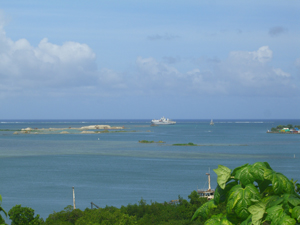 When we returned to the hotel, I noticed the cable ship was leaving the harbor. My first thought was it was finally heading to Guam. For some reason it simply move outside of the reef and then sat at anchor for a couple of days.
When we returned to the hotel, I noticed the cable ship was leaving the harbor. My first thought was it was finally heading to Guam. For some reason it simply move outside of the reef and then sat at anchor for a couple of days.
Cindy and I went to the Sei Restaurant for dinner, we got there at 5pm but the don't serve until 6pm, so we went to a strange little market. A small store where many people were selling things outside of the store. It is right behind the police station. The wares were in plastic chests. Mostly toys and things you would find in a Wal-Mart, but not the selection. Cindy managed to find something to buy. I did not. Still it was fun watching people, especially the police officers who would wander out an look at the people there. Many cars would come in and pickup and drop people off. I have forgotten the name of it but will ask Cindy someday when I remember.
Our cab had not returned when we asked so we flagged down another to get to the Sei restaurant. This 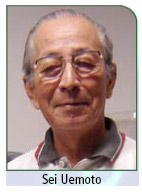 was a very nice restaurant run by an Japanese couple that looked to be somewhere between 60 and 200 years old. They had a buffet set up, absolutely excellent food. They were selling pepper from the Sei Pepper Plantation but it was $50 a pound and they didn't take credit cards. Sadly there were only a few people in the restaurant. One of the ideas to improve the Pohnpeian economy had been to grow pepper plants. This pepper is a relative of the Kava pepper plant. Many investors tried and failed, gourmet pepper is not quite the item for consumers. The Sei farm appears to be the last of its kind. Too bad, actually, because it is quite good.
was a very nice restaurant run by an Japanese couple that looked to be somewhere between 60 and 200 years old. They had a buffet set up, absolutely excellent food. They were selling pepper from the Sei Pepper Plantation but it was $50 a pound and they didn't take credit cards. Sadly there were only a few people in the restaurant. One of the ideas to improve the Pohnpeian economy had been to grow pepper plants. This pepper is a relative of the Kava pepper plant. Many investors tried and failed, gourmet pepper is not quite the item for consumers. The Sei farm appears to be the last of its kind. Too bad, actually, because it is quite good.
Cindy was worried about her boyfriend, Berry who was in Florida visiting his dying mother. Cindy very much wants to return with Berry. [July 1, 2019 note] Cindy is an unrepentant libertarian, Barry an insightful, left leaning moderate. I listened to many of their spirited conversations riding the bus on Kwaj. Recently, Barry returned to the US (CONUS for you military types) without Cindy. No surprise to me. Cindy acquired a new boyfriend. [The story on Kwaj is: You can't lose your boy/girlfriend but you can lose your turn.] Cindy wants to retire to Pohnpei with him. I wish her good luck.